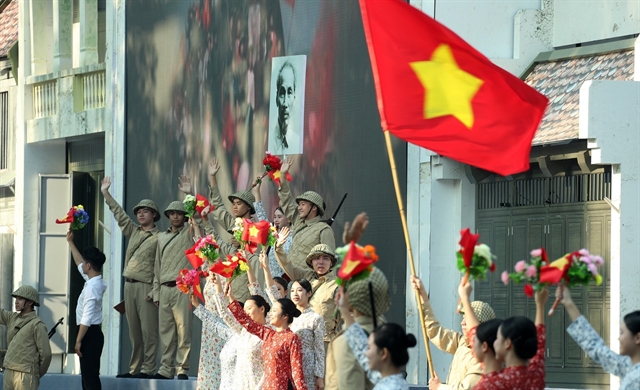 Expat Corner
Expat Corner

 |
| LOUD AND PROUD: A recent re-enactment of Liberation Day. — VNA/VNS Photo |
Alex Reeves - @afreeves23
On the 70th anniversary of Việt Nam's Liberation Day, a commemoration of the country finally realising the independence they fought for from 1945-54, we see the importance of such remembrance, even in the modern Việt Nam that was born from the triumphs of those days past.
Commemoration and remembrance are not things of the past in our host nation, they’re alive and kicking. Functional and important parts of the national psyche, both by design and through an almost universal love and respect for achievements that are within living memory, with many of the revolutionary generation still revered in society here.
Elder statesmen and women for that matter will recant memories of a time when a feeling of hope and the words of President Hồ Chí Minh were the people's guiding lights as they looked for a new way, a Vietnamese way, after over six decades of French colonial rule.
Today, we find streets as they so often are, but with more fervour than usual, adorned with Vietnamese and Communist flags. Delegations from all over the country will visit the capital today to recall a true landmark moment in the history of the nation. Songs to be chanted and medals to show. The patriotism will be palpable.
So, what then, do ‘we’ make of all this? We, the migrants, foreigners and non-natives. How do we as guests from different corners of the globe perceive these rather flamboyant and extroverted displays of national pride? It’s a tough one to boil down with such a diverse mix of ‘expats’ that now feel at home in Việt Nam.
Many of us are not used to such open patriotism and the prevalence of the national flag on every street is distinctly alien. With Europe’s modern history of colonialism, war and varying ideologies leaving their psychological marks on how we feel about our flags, it’s just not the ‘done thing’ back home.
Elsewhere, in the US and much of Latin America, it’s a part of life and patriotism, especially in the US, is a respected and expected concept, in equal measure. It’s the norm and its very absence in someone would be something for potential concern.
This itself, has become a flashpoint in recent years, as some sections of society back home, seemingly wherever that may be, feel that flying the flag now comes with a stigma attached, some agree, some not, either way, it’s clear that the topic of patriotism and how we display that feeling has become divisive.
Thankfully, that does not seem to be the case here. I can still strike up a conversation with a stranger in the middle of a national football game shown at my local watering hole and share a halftime chat about both of our countries, without stepping on someone’s national superiority complex.
The concept of patriotism isn’t controversial here and nor should it be. It hasn’t been mixed up and confused by the noise of nationalism and other thinly veiled notions. Patriotism is not about saying my country is better than yours, it’s about saying “I love my country” and when your country is Việt Nam, there’s a lot to love. — VNS




